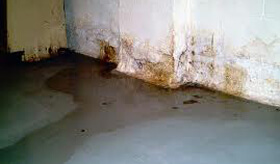Cove seepage

The cove joint in a basement is found where the wall meets the floor. This area of the home can be extremely vulnerable to ground water seepage. The soil around a foundation has constantly changing moisture levels. When it rains, it raises the water table. When there are dry spells, the water level goes down. However, the rising and falling of these moisture levels can put a significant amount of pressure on your foundation walls. Eventually, the hydrostatic pressure (water pressure from the soil) will prove to be too much, and it will break through the seal in your cove joint.
Water is known for always finding the path of least resistance, and if there is a break in the cove joint, seepage will easily be able to get inside via this opening. Once inside, the moisture can do a lot of harm to the basement environment, including damage to the structural integrity of the home over time.
Wet, Leaky Basement
This moisture, once inside the home, will lay stagnant on the floor. This can cause stains to form here, and it can also lead to problems for any wooden materials, including support beams and floor joists, as well as other structures which are partially responsible for bearing the weight of the home. When these supports start to rot, it doesn't only jeopardize the structural integrity of a home, but it can also be very attractive to pests, including termites, roaches, snakes, and mosquitoes. These are all things that no homeowner wants to deal with.

Additionally, this moisture will lead to the development of hazardous mold, mildew, or bacteria. This could make a family really sick. Mold has been known to cause some serious health problems, including headaches, asthma attacks, and serious respiratory problems.
Furthermore, water in the basement will cause the home's value to decrease significantly. This is bad news for any homeowner who is thinking about putting their home on the market. Step one would be to get this water problem taken care of before you ever even think about selling your home. Prospective home buyers are much more likely to purchase a home with a dry basement than one that leaks all the time and doesn't have a waterproofing system in place.
Repairs for Cove Seepage
Some waterproofing contractors will suggest sealing the cove joint to prevent water from seeping inside. However, studies over the years have indicated that this may not be the best way to go about fixing the problem. Eventually, the hydrostatic pressure from the soil will break through this seal, as well.
Interior drain tile systems are the most commonly used solution to water seeping in through the cove joint. This waterproofing system will be able to easily relieve upward pressure from the outside of the home, and any water collected will be sent into a sump pump where it will ultimately be pushed out and way from the basement of the home.
It is also recommended to have an exterior waterproofing membrane installed on the outside of the foundation wall. This will protect the inside of the home from any leaks that may try to get in through a cracked foundation.
